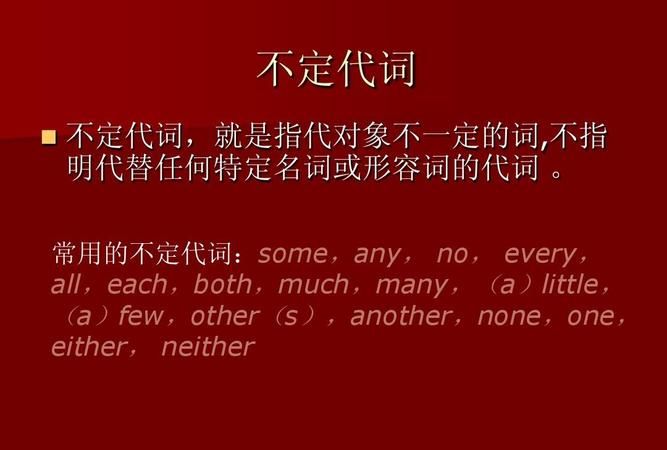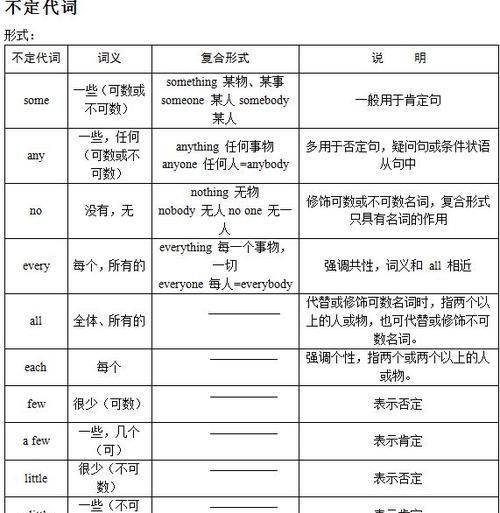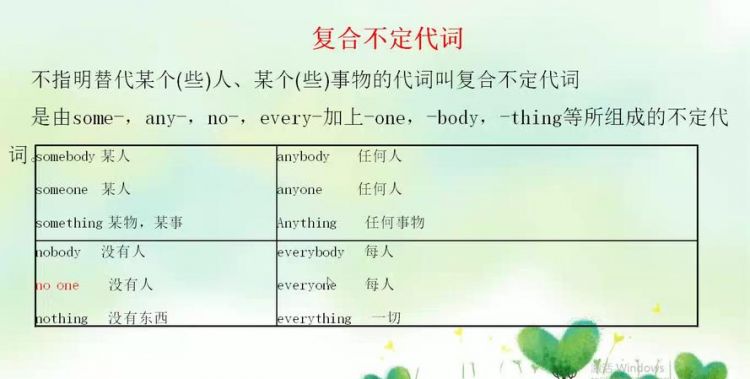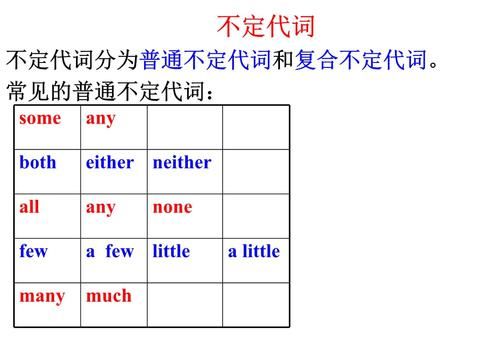本文目录
复合不定代词用法
�一、不定代词的用法
��不定代词大都可以代替名词和形容词,在句中作主语、宾语、表语和定语。
��1.作主语
��both of them are teachers.他们两人都是教师。
��2.作宾语
��i know nothing about this person.我对这个人一无所知。
��3.作表语
��this book is too much for a child.这本书对一个小孩来说太难了。
��4.作定语
��there is a little water in the glass.玻璃杯里有一些水。
��二、常用不定代词用法举例
��1.some 一些,某些,某个
��不定代词some可以代替名词和形容词,常用在肯定句中作主语、宾语、定语等。作定语时,它可以修饰可数名词(单、复数皆可)和不可数名词。例如:
��some are doctors,some are nurses.有些人是医生,有些人是护士。(作主语)
��2.any一些,任何
��不定代词any可以代替名词和形容词,常用在否定句或疑问句中作主语、宾语、定语等。作定语时,它可以修饰可数名词(多为复数)和不可数名词。例如:
��there isn’t any ink in my pen.我的钢笔没有墨水。(作定语)
� 不定代词any有时也可以用在肯定句中,表示"任何的"。例如:
� you may come at any time;i’ll be home the whole day.你任何时候来都行,我整天都将呆在家里 。
��不定代词any也可以用作副词,做状语,表示程度。例如:
��is he any better today?他今天好一点了吗?
��3.all 全体,所有
��不定代词all在句中可以作主语、宾语、表语、定语或同位语。它可以代表或修饰可数名词和不可数名词。代表或修饰可数名词时,指两个以上的人或物。作先行词时,引导词用that。例如:
��all were present at the meeting.全都到会了。(作主语,代表可数名词)
��4.both 全部,都
��不定代词both指两个人或事物。和all一样,可以用作主语、宾语、定语或同位语。例如:
��we invited both to come to our farm.我们邀请两个人都来我们的农畅�(作宾语)
��5.none 无人或无物
��不定代词none的含义和all相反,和no one,not any同义,但其用法相当于名词,在句子中一般作主语或宾语。它代替不可数名词作主语时,谓语动词用单数形式;代替可数名词作主语时,谓语动词用单、复数皆可。例如:
��none of the problems is /are easy to solve.这些问题没有一个是容易解决的。(作主语, 代替可数名词)
��6.either 两者之中的任何一个,这个或那个。
��不定代词 either 可以作主语、宾语和定语。例如:
��either of them will agree to this arrangent.他们两人中会有人同意这样的安排的。(作主 语)
��7.neither 两个之中一个也不是
��不定代词 neither 是 either 的否定形式,可以作主语、宾语和定语。例如:
��neither is interesting.两个都没有趣。(作主语)
��8.each 每个,各自的
��不定代词each指每一个人或事物的个别情况,甚至指这些个别情况各不相同。它在句中可以作主语、宾语、定语和同位语。例如:
��she gave the children two apples each.她给了每个小孩两个苹果。(作the children的同位语。)
��9�every 每个,每一的,一切的
��不定代词every有"全体"的意思,和all的意义相近,但只能作定语。

不定代词的用法总结
很多,耐心看:
不定代词:不指明代替任何特定名词或形容词的代词叫做不定代词。常见的有:
some, somebody, someone, something, any, anybody,anyone, anything, no, nobody, no one, nothing, all, both, neither, none, either,each, every, everybody, everyone, everything, other, another, much, many, few, a few, little, a little,one等等。
不定代词的功能:
1、 做主语:
Is everybody here?
All is well and ends well.
Nobody else said anything.
2、 做宾语:
I know a little about the novel.
I am speaking for myself, not for others.
Here are two books,you can take either of them.
3、 做表语:
That’s all for today.
It’s too much.
I’m not somebody, I’m nobody.
4、 做定语:
Each book on the shelf is worth reading。
Let me have another cup of tea.
Many people attended the meeting.
5、 做状语:(部分代词)
The film lasted some two hours.
Ts she any better today?
They will come back a little later.
all, ever, each
each,可以指小到两个,all、every 则至少指三个。
all 表所有项目的总和,是一个不可分割的整体。
eg:All the students contributed to the fund.
every 是由各个项目集合而成一个整体,其构成成分有共性。
eg:every child in the class passed the exam.
each 的注意力集中在个别项目上,其构成成分各具特性。
eg:I asked all the children,each told a different story.
注意: 修饰单数可数名词包括集体名词,一般用the whole.
eg:The whole pie was eaten.
The whole class was invited to the party.
some, any
any和some 皆表示不定量,都可接可数和不可数名词。any 多用于疑问句、否定句,有时也用于肯定句;some多用于肯定句,偶尔也用于疑问句。
any
1、Are there any stamps in the drawer?
2、He did not make any mistakes in his spelling.
3、He came without any money。
4、She kissed her brother,but was afraid to ask any questions.
5、We had no idea that any serious losses had been inflicted on the company.
some
Some people are early risers.
The mother is doing some washing now.
I read about it in some book.
Are there some stamps in the drawer?(说话人知道,只是想证实而已)
I do not like some of them.(部分)
Would you like some beer?
everybody, everyone, one
everybody/everyone和every 一样,都含有“各个”的意思,但前者多指所有的人;后者多指说话人所熟悉的人。
everybody/everyone eg:
Everybody’s business is nobody’s business.
In here everyone is a comrade.
one:泛指人时相当于you,we等。
One does not like to have one’s word doubted.(美语中,常用his 代替 one’s)
no one ,none
no one 仅指人,none 可以指人也可指物。no One= nobody
eg:No one failed the exam.
No one come to see me.
none:
None of the students failed the exam.
None but the lonely heart can know my sorrow heart.
both,two
强调两个人或物时(不止是一个),才用both。eg:
There were two dogs on the porch. Both were fast asleep.
The two of them were invited.
Notice will be sent to the two of you.
other,another
other常与复形名词以及单形不可数单词连用分别表示复念和零念。当前面加上“the, this, that, some, any, each, every, no, none, one, or ”以及形容词性物主代词时,表示单念。eg:
Jones is here,but where are the other boys?
Moral beauty ought to be ranked above all other beauty.
Each member must bring on other person.
She only comes every other day.
I read it in some book or other.
Any other person than her husband would have lost patience with her.
other 有复数形式:others
We should not think only of our own children, there are others to cared for also.
The search party was divided into two groups. some went to the right, others went to the left.
another:表示单念,可数,做定语时后接单形名词或代词one.
Do not say another word.
Where can we find another like her?
This pen does not work i must buy another.
Tell them I am not very well. I will go and see them another day.
注意:another day 指未来,the other day指过去。

不定代词的用法
由body,one,thing构成的合成代词:
somebody anybody everybody nobody
someone anyone everyone no one
something anything everything nothing
作代词的限定词:
all another any both each either
few little many much neither none
other some
还有不能兼作代词的限定词(形容词) (主要是every,no)。
用法
1. one和it的用法区别
one只能代替可数名词,其复数形式是ones,分别泛指同类中的任何一个e79fa5e98193e4b893e5b19e31333363396362或几个;it特指前面提到的同一物。
This sweater is too small for me. I want a big one. 这件羊毛衫我穿太小了,我想要一件大的。
My aunt knitted a new sweater and gave it to me as a birthday gift. 我姑妈织了一件新毛线衫,把它作为生日礼物送给了我。
2. all, every, any, each, none, both, either, neither的用法区别二者三者或三者以上
肯定意义
both (都)/either (任意一个)
all (都)/every (每一个) / any (任意一个)
each 二者或三者以上(每一个)
否定意义 neither none
All was quiet and still. 一切都很寂静。
Every day is a new opportunity, and I have learnt to treasure every minute of each day. 每一天都是新机会,我学会了珍惜每一天的每一分钟。
Each has his own task. 每人各自有该做的工作。
I saw neither Mr Smith nor Mrs Smith at church. 我在教堂里既没看见史密斯先生也没看见他的太太。
3. another, (the)other, (the)others的用法区别
another
泛指意为“另一个,又一个”指不定数目中的另一个
another+单数名词
another单独使用
another+数词+复数名词
other
泛指
表示“另一些,其他的”
other+复数名词
others单独使用
The other
特指
表示“两者中的另一个”
the other单独使用
the other+单数名词
the other(+数词)+复数名词
The others
特指
表示一定范围内的“其他”
the others单独使用

不定代词用法
用 法 :代替名词和形容词
作 用 :作主语、宾语、表语、定语和状语
位 置 :不定代词+形容词 不定代词+to do
采纳哦

以上就是关于不定代词怎么使用 ,复合不定代词用法的全部内容,以及不定代词怎么使用 的相关内容,希望能够帮到您。
